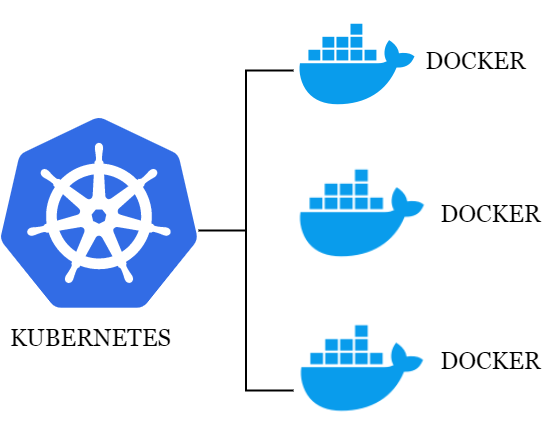We will also talk about some of the alternatives to the orchestration tools other than Kubernetes. We will further go and dig the comparison between Docker Swarm and Kubernetes in detail.
What is Docker?
It might look to an unripe eye that developing an app is all about writing a strong code. But the real challenge lies in dealing with multiple languages, working on different frameworks and managing disrupted interfaces between the tools. The Docker comes to the rescue here! It is a way that helps the users to get a hold on the application during the development and the run-time. It mitigates the issues faced during these stages. It also helps in getting a fine grip on how the application should be exposed to the network, manages the usage of storage and memory, and also handles the access permission outside the application. To summarize, it is a way to provide a consistent environment on any OS-compatible host (Linux or Windows).
Docker Features
Easy and fast configuration – Codes can be deployed in less time with minimal efforts Increases productivity – It reduces the resources and is also helpful in the rapid deployment of applications. Application isolation – Dockers use the containers to run the applications. These containers provide isolation to these applications. Security Management
Many applications run on Docker.
What is a Kubernetes (or K8s)?
Kubernetes is a container management tool that automates the deployment. It’s an open-source portable platform designed by Google and now managed by a Cloud-native computing foundation. It helps in updating the applications in an easier and faster way without any downtime. It handles the work of scheduling containers on the cluster and also manages the workload. Kubernetes has two more names – “k8s” and “Kube.” This orchestration platform automates many manual processes, such as deployment, management, and scaling of the applications in the container.
Kubernetes Features
Automates manual processes – Just describing the desired state using Kubernetes, and it will change the existing change into the desired one. Load balancing – Kubernetes is good in load balancing in case there is more traffic to the container. It distributes the network traffic and keeps the deployment stable. Self-healing – This is one of the best features of Kube. It restarts the failed containers, replaces them, and also kills the one that is not responding to the user-defined pattern. Storage orchestration – Users can automatically mount a storage system of their own choice using Kubernetes.
Docker VS Kubernetes
Docker and Kubernetes are different technologies. So, it is somewhat unfair to compare these two or to question which one should be given priority. These two aren’t direct rivals. They are related, though! Docker is a container platform, while Kubernetes is a container orchestrator for containerization platforms like Docker. Let’s understand this in detail with the below image.
This illustrates that Docker and Kubernetes go hand to hand and work in parallel.
Let’s look into some of the similarities between Docker and Kubernetes.
Both get attracted to a microservice-based architecture. They are majorly written in Go, which allows them to be shipped as lightweight binaries. Both use YAML files, and these files are easily human-readable.
Preference for Docker and Kubernetes
If we look at any application from a theoretical perspective, it will look all smooth and hassle-free. The real challenges can only be seen after the practical implementation. Points that need to be taken into consideration for a successful result of any application are states here:
Whether this technology is economical? Does it provide growth in business? Will it help in reducing the downtime? Will it prove helpful in saving the resources? Will it avoid unintended human errors? Will it increase computing horsepower?
Then out of Docker or Kubernetes, we have to choose one or another depending on the use case.
When to choose Docker?
If your use case is adopting microservice-based architecture, you should use Docker containers for each microservice. The best use-case of the containerization platform as a Docker is for microservice architecture.
When to choose Kubernetes?
Kubernetes is a very rapidly evolving technology because of its open-source platform’s feature. Every organization is providing its plugins in terms of different services like networking. The use of those plugins, especially in the production environment, can cause a high risk to the Security. So for safeguarding the security aspect, it is suggested to use some solid cloud-based hosted solution.
Docker vs. Kubernetes based on use-case
Kubernetes Alternatives?
Below are some of the orchestration tools that can be proved as nice alternatives to Kubernetes.
After Kubernetes and OpenShift, Docker Swarm is more popular in the industry. Let’s discuss Docker Swarm and analyze how it is different and where it stands against Kubernetes.
What is Docker Swarm?
This is an in-house container orchestration tool developed by Docker to play along with containers running on the Docker environment. It is used for clustering and scheduling. It allows multiple managing containers that are deployed across multiple host machines. It uses the standard Docker API and networking, thus making it easy to drop into any docker environment.
Working Principle Of Docker Swarm
Backward compatibility Secure by default with certificates Resilient and single-point-of-failure architecture Simple yet dynamic with a “just works” user experience
Kubernetes vs. Docker Swarm
Both of these orchestration tools offer much of the similar functionalities. The only difference lies in their fundamental ways of how the two get operated. The below table is capturing the better picture of comparison.
Conclusion
We have discussed Docker and Kubernetes in detail and found that it’s not Docker, rather it is the Docker Swarm that is a competitor of Kubernetes. We also encapsulated that Kubernetes is dominating over Docker Swarm and has the upper hand over it. If you are interested in learning in-depth, then I would suggest this Docker Mastery course.












